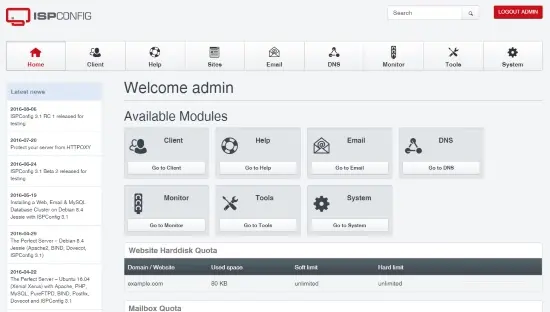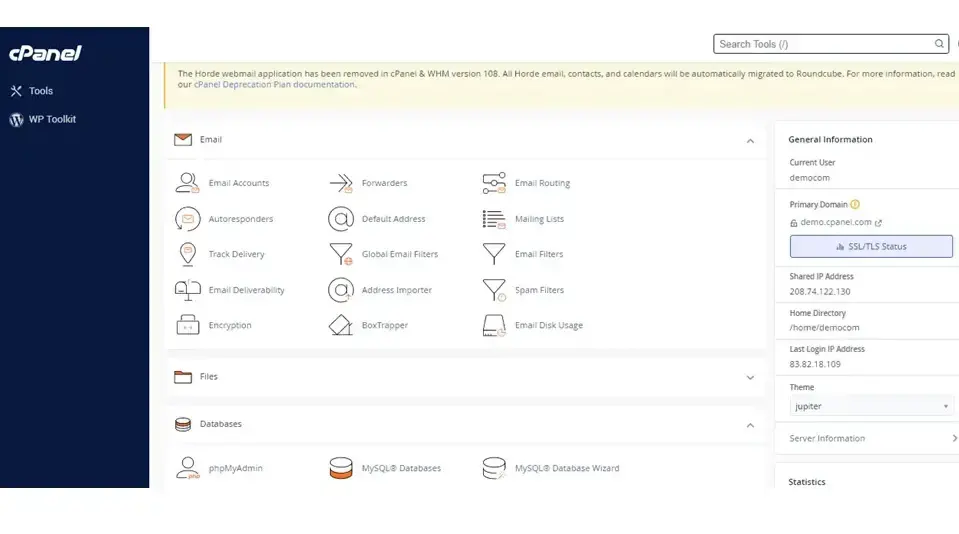The choice between cPanel and ISPConfig can significantly influence how you manage servers, websites, and client accounts. cPanel offers a robust, feature-rich interface that is particularly appealing to web hosting providers, resellers, developers, and small businesses seeking a powerful yet user-friendly solution.
Meanwhile, ISPConfig provides a flexible, open-source framework ideal for those who value customization and cost-efficiency. Understanding the unique strengths of each control panel helps you make a decision that optimizes your hosting operations and enhances your online presence.
Key Differences Between cPanel and ISPConfig
| Feature | cPanel | ISPConfig |
|---|---|---|
| User Interface | Intuitive, user-friendly, suitable for beginners and advanced users. | Less intuitive, requires more technical knowledge to navigate. |
| Automation and Scripting | Advanced automation and scripting with a comprehensive API and CLI support. | Basic automation, API available but less extensive than cPanel’s. |
| Security Features | Comprehensive security suite including CageFS and Security Advisor. | Provides basic security features, less comprehensive than cPanel. |
| Backup and Restore | Flexible options with automatic backups and restore points. | Backup capabilities available but less customizable than cPanel. |
| Resource Management | Detailed monitoring of CPU, memory, and disk usage. | Basic resource monitoring, less detailed than cPanel. |
| Integration and Compatibility | Seamless integration with popular third-party applications like WordPress and Git. | Limited integrations, may require manual setup or additional configuration. |
| Support and Community Resources | Premium support, extensive documentation, and a large community. | Limited support, smaller community with fewer resources. |
| Pricing | Tiered pricing based on the number of accounts, offering flexibility. | Flat fee pricing, cost-effective but less flexible. |
| Scalability | Highly scalable, suitable for growing businesses and large-scale operations. | Scalable, but better suited for small to medium-sized setups. |
cPanel
cPanel has been a foundational tool in web hosting since 1997, known for its comprehensive functionality and intuitive design that have set the industry benchmark. It offers an extensive range of features including website management, email handling, security measures, and resource monitoring making it a preferred choice for a wide range of users.
With its widespread adoption, ongoing innovation, and large community, cPanel provides a reliable and efficient platform that simplifies server management and enhances online presence.
Its ability to seamlessly integrate with popular third-party applications and services, such as WordPress and Git, adds to its appeal, particularly for those seeking ease of use and extensive customization options.
cPanel's premium support, detailed documentation, and robust community resources further ensure that users have the guidance they need to manage their hosting environment effectively.

ISPConfig

ISPConfig is a dynamic open source web hosting control panel that has been a popular choice since its introduction in 2005. Developed by projektfarm GmbH, it offers a flexible and cost-effective solution for managing websites, email, and DNS services.
Its open-source design allows users, from individual developers to small and medium-sized businesses, to customize their hosting environment according to their specific needs. With multi-server management capabilities and a community-driven development approach,
ISPConfig provides a scalable platform that is both adaptable and efficient. For those looking for a robust, customizable alternative to commercial control panels, ISPConfig remains a top choice, offering a balance between flexibility and cost-efficiency.

Feature Comparison
1. Automation and Scripting: cPanel offers advanced automation and scripting capabilities through its API and Command Line Interface, allowing for easier integration with third-party tools. ISPConfig also has an API, but it's less extensive than cPanel's. These automation features help save time and increase efficiency.
2. Security Features: cPanel provides comprehensive security measures, including CageFS, a virtualized file system, and Security Advisor, which scans for vulnerabilities. ISPConfig has security features as well, but they are less extensive compared to cPanel’s robust security framework. This additional layer of protection in cPanel offers peace of mind to users.
3. Backup and Restore: cPanel offers flexible backup and restore options, including automatic backups and restore points. ISPConfig also has backup capabilities, but they are not as customizable as cPanel’s. This flexibility in cPanel ensures data safety and easy recovery.
4. Resource Management: cPanel provides advanced resource management tools, including CPU, memory, and disk usage monitoring, helping prevent server overload. ISPConfig also includes resource monitoring, but it is less detailed compared to cPanel’s comprehensive tools.
5. Integration and Compatibility: cPanel integrates seamlessly with popular third-party applications and services, providing extensive compatibility that ensures seamless interaction with other tools. ISPConfig offers some integration options, but they are less extensive.
6. Managing Domains: cPanel excels in domain management, offering an intuitive interface for adding, removing, and configuring domains, subdomains, and parked domains with ease. It also provides comprehensive DNS management tools directly from the dashboard. ISPConfig supports domain management as well, but its interface and configuration options are more technical, making it less user-friendly for beginners.
Pricing Models Comparison
Licensing Model: cPanel and ISPConfig have different licensing models. cPanel offers a tiered pricing structure based on the number of accounts, providing flexibility and scalability for growing businesses. ISPConfig, with a flat fee for unlimited accounts, may appeal to those looking for a simpler, fixed-cost solution.
Cost-Effectiveness: While ISPConfig’s flat fee may seem attractive, cPanel’s tiered pricing offers better value for small to medium-sized businesses, including more features and support in the long run.
Support and Updates: cPanel’s pricing includes premium support and regular updates, ensuring users have access to the latest features and security patches. ISPConfig’s flat fee does not provide the same level of support and updates.
Overall Value: cPanel's pricing structure offers more value overall, with a wider range of features, better support, and more flexibility, aligning well with business needs.
Community Support and Resources for cPanel vs. ISPConfig
1. Integration Guides: cPanel provides detailed integration guides for various third-party applications and services, making extending functionality and customising setups easier. ISPConfig offers some integration documentation, but it is less extensive and may not cover as many third-party tools. The comprehensive integration guides from cPanel facilitate smoother expansions and customizations.
2. Community-Driven Plugins and Add-ons: cPanel has a vast ecosystem of third-party plugins and add-ons developed by its large community, enhancing its functionality and flexibility. ISPConfig has fewer third-party pluginsand add-ons due to its smaller user base, which can limit customization options. The abundance of community-driven plugins for cPanel allows for greater adaptability and enhanced features.
3. Official Certification Programs: cPanel offers official certification programs, which provide structured learning paths and credentials for users to validate their expertise. ISPConfig does not have a formal certification program, which may impact the ability to validate skills professionally. cPanel’s certification programs help users gain formal recognition and deeper platform knowledge.
4. Video Tutorials: cPanel benefits from many video tutorials produced by the company and its user community, offering visual and practical learning experiences. ISPConfig has fewer video tutorials available, making learning and troubleshooting more challenging. The extensive video resources for cPanel support diverse learning preferences and practical understanding.
5. Community Forums for Troubleshooting: cPanel’s community forums often feature dedicated sections for troubleshooting various issues, supported by many active users and experts. ISPConfig’s forums are smaller and less specialized, which can result in slower or less detailed troubleshooting support. The specialized troubleshooting sections in cPanel’s forums generally provide more targeted and effective assistance.
Pros and Cons of cPanel vs. ISPConfig
Pros and Cons of cPanel
Pros
Cons
Pros and Cons of ISPConfig
Pros
Cons
Use Cases of cPanel vs. ISPConfig
1. Reseller Hosting
Reseller hosting businesses that need to offer a user-friendly control panel to their clients generally prefer cPanel for its well-established reputation and customer support, which enhances the overall user experience. ISPConfig, while functional, might not provide the same level of ease-of-use and reseller-specific features.
2. Small to Medium Businesses
For small to medium-sized businesses looking for an intuitive and reliable control panel, cPanel is often preferred due to its well-established reputation, ease of navigation, and extensive documentation. Although powerful, ISPConfig might present a steeper learning curve and fewer pre-configured options for users unfamiliar with server management.
3. Managed Hosting Services
Managed-to-host services prioritising ease of use and customer support tend to favour cPanel's streamlined interface and comprehensive management tools. ISPConfig can be more suited for users who need a more customizable, open-source solution but might lack the same level of support and user-friendly features.
4. Educational Institutions
Educational institutions requiring a straightforward, reliable control panel for managing multiple websites and user accounts often choose cPanel for its easy setup and strong customer support. ISPConfig’s advanced features might be appreciated by technical staff, but cPanel’s more intuitive design often wins in a diverse educational environment.
5. Freelancers and Consultants
Freelancers and consultants managing multiple client websites often prefer cPanel due to its ease of use, quick setup, and extensive documentation, simplifying management tasks. While ISPConfig offers flexibility and customization, cPanel's user-friendly interface and strong support network make it a more practical choice for those juggling various client needs.
Decision-Making Frameworks for Choosing a Control Panel
1. Technical Requirements: Consider the technical requirements of your server and website, such as operating systems, database management, and programming languages. Ask yourself: "Does the control panel support my technical requirements?" and "Can it integrate with my existing infrastructure?" Key decision points include compatibility, scalability, and customisation options.
2. User Experience: Evaluate the control panel's user experience, including ease of use, navigation, and features. Ask yourself: "Is the control panel user-friendly?" and "Does it provide clear documentation and support?" Key decision points include intuitiveness, responsiveness, and mobile compatibility.
3. Security and Compliance: Assess the control panel's security and compliance features, such as access controls, backups, and updates. Ask yourself: "Does the control panel meet my security and compliance requirements?" and "Can it protect against common threats?" Key decision points include security protocols, audit logs, and compliance certifications.
4. Scalability and Flexibility: Consider the control panel's scalability and flexibility, including resource allocation, upgrade options, and customisation capabilities. Ask yourself: "Can the control panel grow with my needs?" and "Does it offer flexible configuration options?" Key decision points include resource limits, upgrade paths, and API access.
5. Cost-Benefit: Evaluate the control panel's cost-benefit ratio, including licensing fees, support costs, and ROI. Ask yourself: "Is the control panel cost-effective?" and "Does it offer a strong return on investment?" Key decision points include pricing models, support options, and total cost of ownership.
Conclusion
When selecting a control panel, consider what matters most for your hosting environment. cPanel provides a significant advantage with its comprehensive features, ease of use, and strong support network, making it an ideal choice for users who want a reliable, all-in-one solution that simplifies management and scales with their business needs.
ISPConfig, with its open-source flexibility and cost-effectiveness, is a solid alternative for those who prefer a more customizable setup and are comfortable with a technical approach.
Ultimately, for most businesses and hosting providers looking for a straightforward, robust platform, cPanel often emerges as the more versatile and dependable option. Assess your priorities carefully to choose the control panel that aligns best with your operational goals and growth strategies.
Frequently Asked Questions
What are some free control panel alternatives to cPanel and ISPConfig?
Several free control panels serve as alternatives to cPanel and ISPConfig. Examples include CentOS Web Panel, which offers a range of essential features for server administration, DirectAdmin, known for its robust features and lower licensing costs, and other control panels like Virtualmin and Froxlor.
How do cPanel and ISPConfig differ in terms of server administration and management?
cPanel is a comprehensive control panel with a more user-friendly interface, offering advanced features like file management, email accounts handling, database management, and robust security measures. It's the go-to choice for website owners, hosting companies, and hosting providers looking for a web-based interface that simplifies server administration. ISPConfig, on the other hand, is a free control panel that is highly customizable and suitable for system administrators and experienced users with technical expertise. It supports managing multiple servers and system-level tasks across both Linux servers and Windows servers, making it ideal for those who need more control and flexibility.
Are there any significant differences in performance between cPanel and ISPConfig?
Both cPanel and ISPConfig perform well, but performance can vary based on server setup and usage. cPanel’s resource usage may be higher due to its extensive features and user interface, while ISPConfig’s lightweight nature might result in better performance for users managing multiple servers.

Yetunde Salami is a seasoned technical writer with expertise in the hosting industry. With 8 years of experience in the field, she has a deep understanding of complex technical concepts and the ability to communicate them clearly and concisely to a wide range of audiences. At Verpex Hosting, she is responsible for writing blog posts, knowledgebase articles, and other resources that help customers understand and use the company's products and services. When she is not writing, Yetunde is an avid reader of romance novels and enjoys fine dining.
View all posts by Yetunde Salami




















